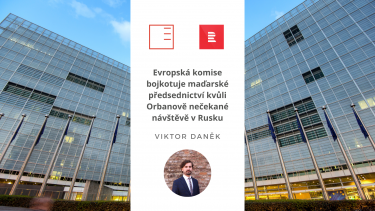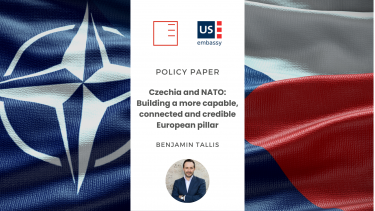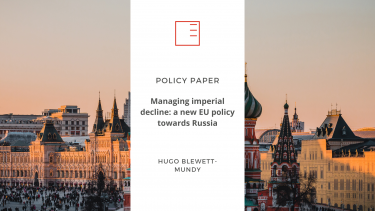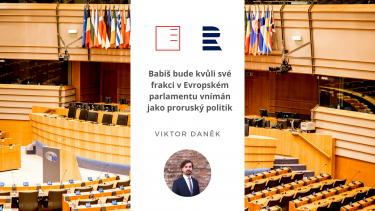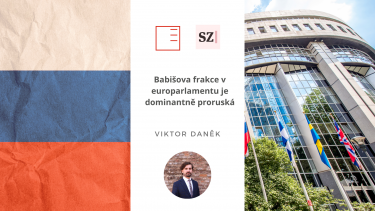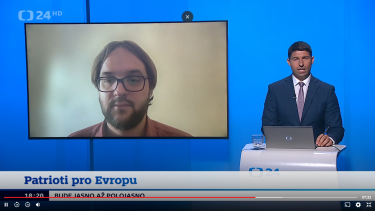e15 | European politicians boycott Hungarian presidency. Will Orbán continue to provoke?
Hungarian Prime Minister Viktor Orbán took over the EU Council presidency less than a month ago, but he has already managed to provoke the EU institutions and most member states with his unauthorized "peace" mission to Russia and China. During this mission, he presented himself as a representative of the European Union, despite having no authority to do so. European politicians have responded to this situation with initial retaliatory measures. How will Viktor Orbán proceed? What strategies and tactics might the Hungarian Prime Minister use during his presidency? Oszkár Roginer-Hofmeister, a research fellow at EUROPEUM Institute, commented on this for e15.
Show more
The Diplomat | NATO's New Mission: Keep America Engaged, Russia in Check, and China Out
In an article for the international magazine The Diplomat, Tereza Novotná, an Associate Research Fellow at EUROPEUM Institute, analyzes NATO's new direction, focusing on the Indo-Pacific region. The alliance aims to keep American engagement, curb Russian aggression, and limit China's influence, with strengthening cooperation with partners like South Korea being crucial for ensuring global stability. The article also includes recommendations for enhancing these relationships.
Show more
ČRo Plus | Slovakia and Hungary face oil supply issues and file a complaint against Ukraine with the European Commission
Russian oil from Lukoil still isn’t flowing through Ukraine to Slovakia and Hungary. In June, Ukraine unilaterally decided to ban the transit of Lukoil oil through its territory, as the company was added to its sanctions list. Slovakia and Hungary have turned to the European Commission for help in resolving the issue. What can the EU do about this situation? What role does the Association Agreement with Ukraine play in resolving this dispute? Viktor Daněk, Deputy Director of EUROPEUM Institute, comments on the situation.
Show moreSTVR | Boycott of the Hungarian Presidency in Council of the EU
Most European Union states have decided to boycott the Council meeting in Budapest. This decision is a reaction to Orbán's "peace mission", during which he met with Russian President Putin, Chinese President Xi Jinping, and former US President Trump under the banner of the Hungarian presidency without any mandate from the EU. Will EU criticism slow Orbán down in his next steps? Can Hungary's presidency be revoked? Does EU foreign policy even need to be unified? The situation is commented on by Viktor Daněk, Deputy Director of EUROPEUM Institute.
Show moreČRo | The European Commission boycotts the Hungarian presidency due to Orban's unexpected visit to Russia
The European Commission has announced that, in light of developments since the beginning of the Hungarian presidency of the Council of the European Union, it plans to boycott informal ministerial meetings and send only senior officials instead of commissioners. Viktor Orbán has come under criticism for his recent trip to Russia, which he described as a peace mission aimed at ending the war in Ukraine and which he did not consult with the leaders of other EU states. This move comments Viktor Daněk, deputy director of EUROPEUM Institute for Czech Radio.
Show morePolicy paper | Czechia and NATO: Building a more capable, connected and credible European pillar
CEE allies are key to building the capabilities-based, European Pillar NATO needs to enact genuine burden shifting and secure the alliance’s future. Dr Benjamin Tallis shows how Czechia can build on recent progress in defense procurement and increase its influence by prioritising the six elements Euro-NATO needs: core national war-fighting capabilities, logistics, military mobility, strategic enablers, air defence and long-range strategic strike.
Show morePolicy paper | Managing imperial decline: a new EU policy towards Russia
Russia's full-scale invasion of Ukraine in February 2022 has shattered the post-Cold War international order built upon East-West interdependence and cooperation. The European Union (EU) - which had tried to pursue a strategic relationship with Russia after the collapse of the Soviet Union in 1991 - must now adapt to the geopolitical reality of Russian neo-revisionism. Hugo Blewett-Mundy, an Associate Research Fellow at EUROPEUM Institute, identifies four areas where the EU's policy towards Russia could evolve to confront this emerging security situation in Europe.
Show moreCzech Radio | Babiš will be seen as a pro-Russian politician due to his faction in the European Parliament
ANO movement leader Andrej Babiš recently co-founded a new group in the European Parliament with Viktor Orbán. Patriots for Europe, considered an extreme right-wing bloc, now include parties of Marine Le Pen and Geert Wilders among others. Czech Prime Minister Petr Fiala labeled it as pro-Russian oriented. Viktor Daněk, Deputy Director of EUROPEUM Institute, commented on Babiš's actions for Czech Radio.
Show moreSeznam Zprávy | Babiš' political group in the European Parliament is dominantly pro-Russian
The ANO movement has joined the new group Patriots for Europe, which it co-founded to promote national interests in Europe more effectively. Now it is third-largest in the European Parliament and includes, among others, the French National Rally of Marine Le Pen, and the Hungarian Fidesz of Viktor Orbán. Viktor Daněk, Deputy Director of EUROPEUM Institute talked in the podcast 5:59 of Seznam Zprávy how this affiliation could affect the perception of the Czech Republic abroad.
Show moreČT24 | Patriots for Europe in the EU
The new political group in the European Parliament, Patriots for Europe, which includes the Czech opposition ANO movement, serves Russia's interests and threatens Europe's security, according to Czech Prime Minister Petr Fiala. Vít Havelka, a senior research fellow at EUROPEUM Institute, commented on the new party for ČT24.
Show more
Staroměstské náměstí 4/1
Prague 1 - Staré Město
110 00
tel.: +420 212 246 552
email: europeum@europeum.org
https://www.europeum.org




